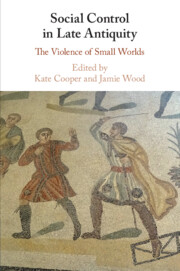Book contents
- Social Control in Late Antiquity
- Social Control in Late Antiquity
- Copyright page
- Contents
- Contributors
- Preface and Acknowledgements
- Abbreviations
- Introduction
- Part I Women and Children First
- Part II ‘Slaves, be subject to your masters’
- Part III Knowledge, Power, and Symbolic Violence
- Chapter 8 John Chrysostom and the Strategic Use of Fear
- Chapter 9 The Fear of Belonging
- Chapter 10 Words at War
- Chapter 11 Of Sojourners and Soldiers
- Chapter 12 Coercing the Catechists
- Part IV Vulnerability and Power
- Bibliography
- Index
Chapter 12 - Coercing the Catechists
Augustine’s De Catechizandis Rudibus
from Part III - Knowledge, Power, and Symbolic Violence
Published online by Cambridge University Press: 18 September 2020
- Social Control in Late Antiquity
- Social Control in Late Antiquity
- Copyright page
- Contents
- Contributors
- Preface and Acknowledgements
- Abbreviations
- Introduction
- Part I Women and Children First
- Part II ‘Slaves, be subject to your masters’
- Part III Knowledge, Power, and Symbolic Violence
- Chapter 8 John Chrysostom and the Strategic Use of Fear
- Chapter 9 The Fear of Belonging
- Chapter 10 Words at War
- Chapter 11 Of Sojourners and Soldiers
- Chapter 12 Coercing the Catechists
- Part IV Vulnerability and Power
- Bibliography
- Index
Summary
Around 400 AD, Augustine of Hippo wrote De catechizandis rudibus, which teaches others how to address non-Christians interested in converting to the religion. Written in a time of increasing state hostility to non-Christians, the text has been used to study ‘coercive conversions’ to Christianity. However, this elides the fact that a North African convert had a choice between two increasingly hostile Christian factions: the one Augustine belonged to, or that of the better established rival bishops Augustine labelled ‘Donatist’. This chapter argues that the treatise should be seen as an attempt by Augustine to use the frame of teacher training as a means of strengthening control over minor clergy in a context of episcopal conflict. De catechizandis rudibus does not address converts directly, but instead the minor clergy who taught them. This focus, in particular on managing their affect (and disciplining the insufficiently cheerful), fits with Augustine’s faction having less social power in comparison to the Donatists at the time of writing. Instead, Augustine used his considerable rhetorical prowess in this treatise to prevent minor clergy from becoming demoralised (or defecting to the opposing bishops) during the conflict.
Keywords
- Type
- Chapter
- Information
- Social Control in Late AntiquityThe Violence of Small Worlds, pp. 256 - 274Publisher: Cambridge University PressPrint publication year: 2020

